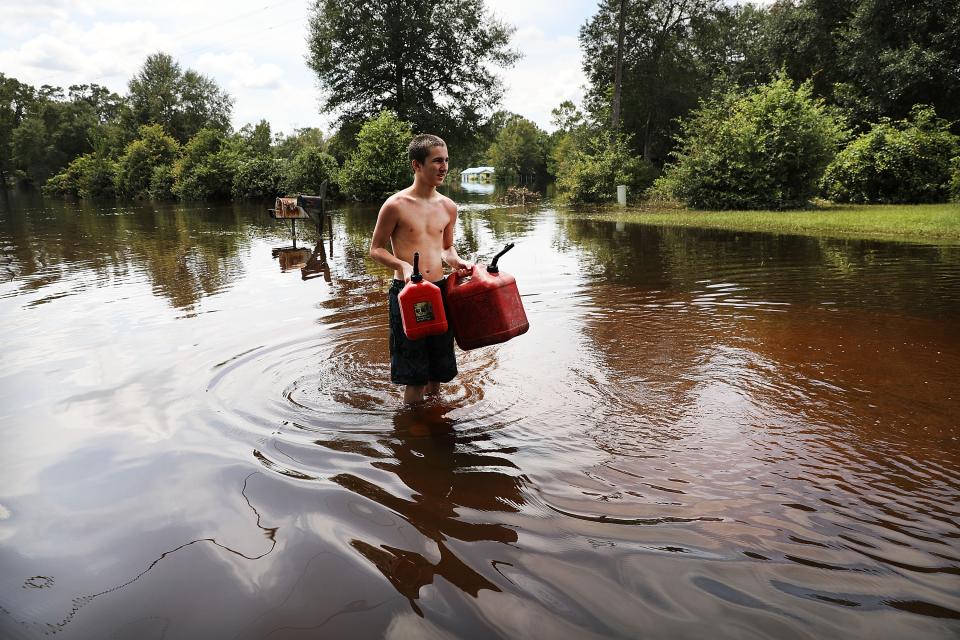No relief at the pumps as Hurricane Irma lingers near Florida

Hesitant gulf refineries and the aftermath of Hurricane Harvey are holding gas prices in Canada at highs not seen in the past five years, and Hurricane Irma could mean even higher prices are on the way.
“The weatherman is calling the shots here,” says Roger McKnight, senior petroleum analyst at En-Pro International Inc. And while he suspects prices in the Greater Toronto Area will drop four cents on Thursday as water levels drop in Houston – a slight dip after leaping 17.5 cents to 129.6 cents a litre from 112.1 cents on average the previous week, according to GasBuddy – the high prices will likely hold for the next few weeks at least.
At one point, Harvey crippled more than a quarter of the U.S.’s processing capacity, according to Time.
“The refineries are being quite cautious and the traders on Wall Street are being just as cautious… a lot of the increases we’ve seen, like the massive increase we saw last week, was really based on speculation that the hurricane in Houston was going to get worse,” says McKnight. “Prices should drop a lot more than they have so far, I think the thing that’s holding it back is the direction of the storm, it’s really quite large.”
Category Five storm Hurricane Irma is being called one of the biggest storms the Atlantic has ever seen. The hurricane is currently on track to hit the Eastern Caribbean islands Wednesday and potentially Florida on Saturday or Sunday.
“It’s really a question of which direction that storm is going to go – if it’s going to swing left or swing right, hit the Gulf or go into the Atlantic,” says McKnight. He points out that while the gas prices are a benign side effect of the storm when compared to the effects on people in places like Houston, these storms are the kinds of things refineries in the Gulf are built to withstand.
“They’re pretty ruggedly built to withstand storms but they can’t withstand a meter of water,” he explains. “If you don’t have power going into a refinery then you can’t get the crude in and you can’t get the refined products out because you have no pumping capability.”
And with Canada’s gas prices thoroughly integrated with the U.S.’s – “We have 13 refineries in this country, the U.S. has 143,” says McKnight – the price hike early last week reflects that slowdown in refinery activities and the hesitant restart.
Quick to rise, slow to fall
Ambarish Chandra, a professor of economic analysis and policy at the University of Toronto’s Rotman School of Management says the “quick to rise, slow to fall” dynamics in the oil market are well-documented. Chandra has studied this effect at length looking at both Canadian and U.S. markets.
“Spikes can be reflected within a day, price drops can take many days, even weeks to be fully adjusted to retail prices,” he says. “It depends on how competitive cities are, the more competitive the market the more competitive the gas stations, the more competition amongst retailers the faster they’ll fall.”
But Canadian prices remain firmly tethered to the U.S., where prices shot up 30 cents.
“The border doesn’t exist when it comes to gasoline prices,” says McKnight. For example, prices dropping in Albany will drive prices in Quebec down and movement in Buffalo or Syracuse will impact Southern Ontario.
“The gas you buy in the U.S. is identical to gas in Canada so the prices have to be more or less the same,” adds Chandra, pointing out that the only difference is the taxes local jurisdictions add on and the transportation costs. “There’s no reason to suspect Canada would ever be able to sustain different prices than the U.S. as long as we continue to be in a single market.”
The silver lining, says Chandra, is we’ve had it good for a while now when it comes to prices.
“We’ve had really low oil prices and gas prices for a long time,” he says. “It’s a big shock the way they jumped but there was a time when this was routine back in 2011 or 2007… we were paying prices like this all the time.”

 Yahoo Finance
Yahoo Finance 